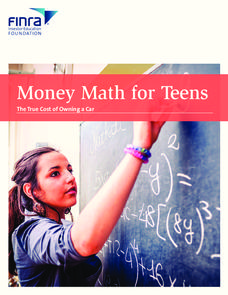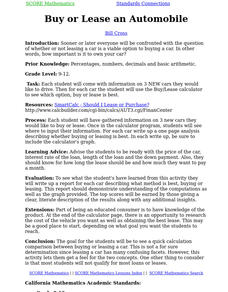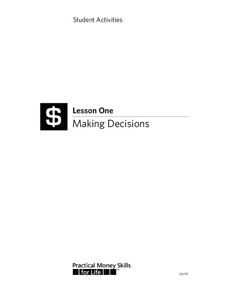Practical Money Skills
Cars and Loans
Most teenagers want to buy a car, but do they know how much it really costs? Calculate the cost of purchasing a car, securing auto insurance, and maintaining the new investment with a thorough and engaging personal finance lesson.
Visa
Cars and Loans
What's the best way to pay for a car? Should I buy used or new? Can I realistically afford a car? Pupils discover the ins and outs of buying a car, from how to shop for car insurance to the advantages and disadvantages of leasing.
SaveandInvest.org
The True Cost of Owning a Car
Almost every teen wants a car, but can they really afford one? The instructional activity walks pupils through how to identify a budget, find all of the costs associated with car ownership, and determine if they should buy the car or...
Curated OER
Buy or Lease an Automobile
Students gather information on 3 new cars they would like to buy or lease, and use mathematical comparisons to decide whether to buy or lease the car.
Curated OER
Buying a Car
Students complete the PLATO ¿¿ Educational Software lesson: Math Problem Solving: Car Costs to determine if he/she can afford to drive the car they are planning to buy.
Curated OER
Buying vs. Leasing Car
Young scholars use the Internet and worksheets to calculate the costs, advantages and disadvantages to buying or leasing a car. They write a summary of their investigation and decide which option they think is better.
Visa
Dream Big: Money and Goals
Whether their objective is independent living, going to college, or buying a car, pupils will participate in discussions and complete worksheets to gain an understanding of how short- and long-term goals play a large role in helping...
Curated OER
New Cars? Selecting and Financing
Twelfth graders determine probabilities of real-life events such as life expectancies, winning a lottery ticket, and the break-even premium. They deduce what percent of markup is. Students are able to compare terms for financing a car...
Federal Reserve Bank
Purchasing a Vehicle
Start your engines! Prevent negative car buying experiences by arming pupils with information. Prepare your young drivers to make informed decisions when they are ready to purchase a car. All aspects are considered from the type of car...
Curated OER
Money Management Part III: Savings Accounts and Cash vs. Credit
Help your class understand the importance of saving and managing their money. Here is part three to a unit on credit, cash, and savings. Learners discuss savings accounts and the idea that a budget plan can help them avoid costly credit...
Curated OER
Budgeting and Travel
Students plan a trip to the Olympics. In this middle school mathematics instructional activity, students are given a worksheet describing the cost of necessities for their trip. Students are given a balance and must purchase airline...
Council for Economic Education
Calculating Simple Interest
How much is owed? A calculated resource introduces the simple interest formula with a video that describes how to use it. Classmates then show what they know by answering questions within a simple interest worksheet.
Visa
Making Decisions
What economic factors can influence personal and financial decisions? In an effort to understand opportunity costs and the time value of money, pupils engage in role-playing activities and discussion, as well as view a PowerPoint...
Curated OER
Public Companies: Power of the People
Learners examine the differences between publicly and privately owned companies. They determine the relationship between publicly traded companies and their shareholders. They determine what it means to be a shareholder and what...















